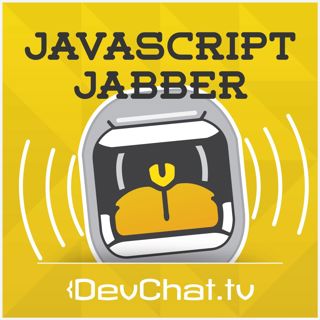
TypeScript Success: Integration, Type Checking, and Generics - JSJ 660
In this episode, Dan sits down with TypeScript expert Matt Pocock to dive deep into the world of TypeScript migration, learning curves, and developer challenges. They explore why having a TypeScript "wizard" is crucial for teams transitioning from JavaScript and how TypeScript's integration with development environments like Visual Studio Code has been a game changer.Dan and Matt discuss the importance of real-time typechecking, the community's role in TypeScript's success, and practical strategies for migrating large codebases to TypeScript. You'll hear about Matt's journey from drama school to becoming a DevRel expert, his contributions to the XState library, and his philosophy of type-driven development. Together, they highlight TypeScript's advantages, such as enhanced code reliability and the nuanced benefits of explicit vs. inferred types.Whether you're a seasoned developer or just starting with TypeScript, this episode offers valuable insights and actionable advice to help you harness the full power of static typing in your projects. Tune in for a fascinating discussion that underscores the value of "boring" code, the need for continual learning, and the ongoing evolution of software development practices. Stay with us as we unravel the intricacies of TypeScript and share practical tips to elevate your coding journey.SocialsLinkedIn: Matt PocockBecome a supporter of this podcast: https://www.spreaker.com/podcast/javascript-jabber--6102064/support.
3 Dec 20241h 20min

React and Beyond: The Importance of Learning DOM APIs - JSJ 659
In today's episode, Charles, AJ and Steve are joined by guests Corey Brown for a rich discussion on the importance of understanding foundational concepts in software development. They explore the balance between leveraging high-level frameworks like React and the necessity of grasping the underlying technologies to troubleshoot effectively and build robust applications. They emphasize the value of comprehending core language features to write better software and solve problems efficiently. Corey reflects on the passion within the software development community and the hidden costs of over-relying on third-party dependencies like the infamous "left pad" incident.As the conversation unfolds, they debate whether sticking to frameworks or delving into deeper technologies leads to long-term success. They share practical insights on the benefits of reading source code, continuously learning, and the significance of core platform APIs. Additionally, the episode includes light-hearted "picks" from the panelists, including humorous resources and personal anecdotes. Join them as they dissect these critical perspectives and share valuable advice for both novice and seasoned developers alike. Let's get started!PicksAJ - Grug BrainAJ - Creeds of CraftsmanshipAJ - AJQuery v3.0.3Cory - Palm Paradise #206Become a supporter of this podcast: https://www.spreaker.com/podcast/javascript-jabber--6102064/support.
26 Nov 20241h 23min

New Horizons in Web Development with Danny Moerkerke - JSJ 658
In today's jam-packed episode, Charles, AJ, and Dan, along with special guest Danny Moerkerke, a seasoned freelance JavaScript web developer from Amsterdam. They dive deep into the fascinating world of web development, focusing on the capabilities and future of Progressive Web Apps (PWAs), comparing them to native apps, and discussing the technical intricacies involved.AJ shares his latest project on passkeys and the challenges of transitioning clients, while Dan gives us a glimpse into his social media habits and movie recommendations. Danny enlightens us with his experiences at IKEA and his passion for web components, PWAs, and crucial APIs like the Wake Lock and Background Sync.They explore the complex interplay between service workers, caching for offline functionality, and the barriers to widespread PWA adoption, particularly on iOS. Plus, they dive into practical applications of these technologies, from gaming to improving podcast accessibility for offline listening.So, tune in as they unravel the technical hurdles, share insightful demos, and debate the future of web and native app development. It's an episode packed with knowledge, practical advice, and a bit of fun along the way!SocialsLinkedIn: Danny MoerkerkeBecome a supporter of this podcast: https://www.spreaker.com/podcast/javascript-jabber--6102064/support.
19 Nov 20241h 27min

Structuring Node.js Applications: Event Loop, Metrics, and Efficient Processing Techniques
In this episode, they dive deep into the essential practices and principles for successful Node.js development. AJ and Dan are joined by special guests Michael Dawson, James Snell, and Matteo Collina. They bring a wealth of expertise and experience to the table, discussing key topics like experimental tech with existing web standards, managing updates with LTS releases, and the fundamental pillars of Node.js, including the critical concept of "not blocking the event loop."They explore the consequences of blocking the event loop, real-world insights into performance issues, and the importance of efficient task handling. They also share their wisdom on utilizing multi-threading, scaling applications, best practices for dependency management, and the significance of regular updates to maintain security and performance.Additionally, they touch on some fascinating side discussions, such as AI's role in coding, the evolution of package management, and the importance of intentional coding practices. There's even a bit of personal insight with recommendations for exciting Netflix series and real-world anecdotes about Node.js conferences and testing frameworks.Join them as they unravel these topics and more, guiding you through advanced Node.js SocialsLinkedIn: James SnellLinkedIn: Michael DawsonLinkedIn: Matteo CollinaLinksThe Nine Node Pillars: 9 Principles for Doing Node.js Right in Enterprise EnvironmentsThe Nine Node Pillars | 9 principles for doing Node.js right in enterprise environments - YouTubePicksDan - Monsters: The Lyle and Erik Menendez StoryDan - The WordPress drama explainedMichael - bee-agent-frameworkJames - NodeConf EUBecome a supporter of this podcast: https://www.spreaker.com/podcast/javascript-jabber--6102064/support.
12 Nov 20241h 44min

Stimulus and Turbo in Web Development - JSJ 656
Dive into the dynamic world of JavaScript frameworks with this week's episode of JavaScript Jabber! Join Charles, AJ, Dan and Steve as they explore Hotwire, Stimulus, and Turbo—tools that are transforming how developers build fast, responsive web applications. They discover the evolution from Turbo Links to Turbo Drive, learn how these technologies enhance page rendering speeds by updating only changed elements, and understand their seamless integration in Rails applications. The discussion also touches on practical implementations using Turbo frames and streams for efficient DOM manipulation. Additionally, they dive into the benefits of partial page updates for improved performance and talk about the insights into integrating Stimulus for fine-grained control over client-side interactions. They also explore the parallels between modern frameworks like React or Angular with traditional approaches.Tune in to uncover how you can leverage these tools to optimize your development workflow!SocialsLinkedIn: Charles WoodPicksAJ - The Fall Guy 4k + Extended CutAJ - Passkeys DemoBecome a supporter of this podcast: https://www.spreaker.com/podcast/javascript-jabber--6102064/support.
5 Nov 20241h 26min

Understanding, Confidence, and Humility in Web development - JSJ 655
Become a supporter of this podcast: https://www.spreaker.com/podcast/javascript-jabber--6102064/support.
29 Okt 20241h 19min

Exploring Local-First Applications and Data Synchronization Challenges: Part 1 - JSJ 654
Become a supporter of this podcast: https://www.spreaker.com/podcast/javascript-jabber--6102064/support.
22 Okt 20241h 35min

Slaughtering Sacred Cows: Reconsidering Software Dev Truisms - JSJ 653
Charles and Dan dive deep into the world of programming languages, development practices, and the trade-offs that shape our daily coding lives. Joining them is special guest Tomer Gabel, an experienced backend engineer, and consultant.In this episode, they unpack the productivity benefits and challenges of using Rails, deliberate on the pros and cons of dynamic languages, and explore the fascinating topic of convergent evolution in programming ecosystems. They also discuss TypeScript's value proposition, the intricacies of static typing, and the sometimes controversial principles of "clean code." Get ready for an engaging conversation packed with expert insights, practical advice, and a few surprising takeaways. Let’s get started!SponsorBlue HostSocialsLinkedIn: Tomer GabelBecome a supporter of this podcast: https://www.spreaker.com/podcast/javascript-jabber--6102064/support.
15 Okt 20241h 45min





















